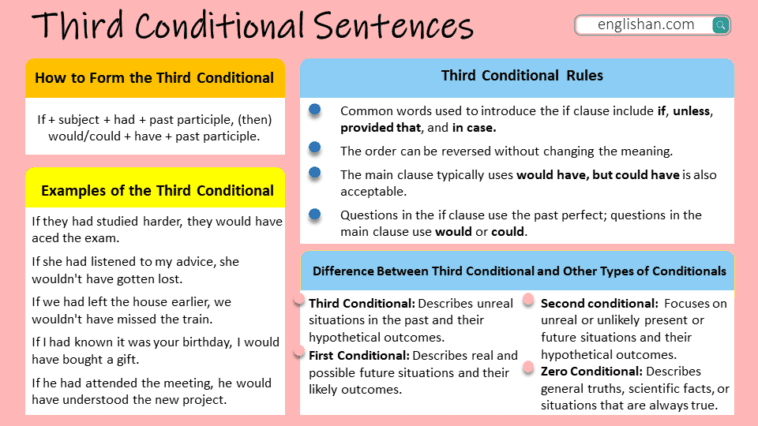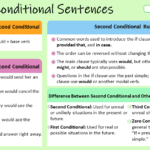Third conditional sentences talk about unreal situations in the past and their hypothetical outcomes. They typically consist of an “if” clause describing the unreal condition and a main clause outlining the imagined result. These sentences express regret or reflection and are flexible in structure.
Structure of a Third Conditional Sentence
The structure of a third conditional sentence typically follows this pattern:
If + subject + had + past participle, (then) would/could + have + past participle.
If Clause (Past Perfect):
- Formed using “if” + past perfect tense (had + past participle).
- Example: If I had known about the meeting,
Main Clause (Would + Have + Past Participle):
- Describes the hypothetical result or consequence.
- Formed using “would have” + past participle.
- Example: I would have attended.
Combined:
- Combine the if clause and the main clause to create a complete sentence.
- Example: If I had known about the meeting, I would have attended.
Characteristics of Third Conditional Sentences
The characteristics of third conditional sentences include:
1. Unreal Past Condition:
- Describe a situation or condition in the past that did not actually occur.
2. If Clause in Past Perfect:
- The “if” clause is formed using the past perfect tense (had + past participle).
3. Hypothetical Result:
- The main clause expresses a hypothetical result or consequence that would have occurred if the unreal condition had been met.
- Formed using “would have” + past participle.
4. Expressing Regret or Reflection:
- Often used to convey regret or reflection about a past event or decision.
5. Flexible Structure:
- The order of the if clause and main clause can be interchangeable.
- “Had” is sometimes used instead of “if” at the beginning of the sentence for stylistic variation.
6. Usage for Unreal Situations:
- Used to discuss and imagine outcomes of unreal or hypothetical situations in the past.
7. Imaginary Scenarios:
- Involves creating imaginary scenarios to explore what might have happened if things had been different in the past.
8. Common Signal Words:
- Signal words like “if,” “unless,” and “had” often indicate the presence of a third conditional sentence.
9. Past Reflection:
- Allows speakers to reflect on the past and consider how things might have been different under different circumstances.
10. Examples:
- Examples often involve expressing what could have been, expressing missed opportunities, or considering alternate outcomes based on past events.
Distinction from Other Conditional Structures
1. First Conditional:
- Third Conditional: Describes unreal situations in the past and their hypothetical outcomes.
- First Conditional: Describes real and possible future situations and their likely outcomes.
- Example (Third Conditional): If he had studied, he would have passed.
- Example (First Conditional): If he studies, he will pass.
2. Second Conditional:
- Third Conditional: Deals with unreal situations in the past and their imagined consequences.
- Second Conditional: Focuses on unreal or unlikely present or future situations and their hypothetical outcomes.
- Example (Third Conditional): If they had invited us, we would have attended.
- Example (Second Conditional): If they invited us, we would attend.
3. Zero Conditional:
- Third Conditional: Concerns about unreal situations in the past.
- Zero Conditional: Describes general truths, scientific facts, or situations that are always true.
- Example (Third Conditional): If it had rained, we would have stayed indoors.
- Example (Zero Conditional): If you heat ice, it melts.
4. Mixed Conditionals:
- Third Conditional: Past unreal condition and past result.
- Mixed Conditionals: Combine elements of different conditional types, often with a present unreal condition and a past result, or vice versa.
- Example (Third Conditional): If she had studied, she would have passed.
- Example (Mixed Conditional): If she studied more, she would be in a better university now.
4. Continuous/Progressive Conditionals:
- Third Conditional: Typically uses simple past tenses.
- Continuous/Progressive Conditionals: May involve continuous or progressive tenses to emphasize ongoing or repeated actions.
- Example (Third Conditional): If she had called, I would have answered.
- Example (Continuous Conditional): If she had been calling, I would have answered.
Variations in the Third Conditional Form
While the standard form of the third conditional involves using “if” and the past perfect tense in the if clause, and “would have” plus the past participle in the main clause, there are variations and alternative ways to structure third conditional sentences for stylistic or emphasis purposes. Here are some variations:
1. Using “Had” at the Beginning:
- Instead of starting the sentence with “if,” you can use “had” to introduce the unreal condition.
2. Switching Clause Order:
- The order of the if clause and the main clause can be reversed without changing the meaning.
3. Contractions:
- Contractions can be used for a more informal tone.
- Example: If she’d known, she would’ve come.
4. Using “Were” for “If I/He/She” Clauses:
- Instead of “if I/he/she,” you can use “were” for all subjects in the if clause for added formality.
- Example: If she were aware of the situation, she would have responded differently.
5. Using “Should” for Hypothetical Advice:
- In the main clause, “should have” can be used for added emphasis or when giving hypothetical advice.
- Example: If you had listened to my advice, you should have avoided this problem.
6. Modal Verbs for Emphasis:
- Modal verbs like “could,” “might,” or “ought to” can be used in the main clause for added nuance.
- Example: If they had arrived on time, they might have caught the bus.
7. Using Different Past Tenses in the If Clause:
- Sometimes, past simple can be used instead of past perfect in the if clause, especially in informal speech.
- Example: If he knew about the discount, he would have bought the item.
8. Adding Emphasizing Words:
- Adding emphasizing words like “certainly,” “definitely,” or “absolutely” can strengthen the hypothetical nature of the sentence.
- Example: If I had seen your message, I definitely would have replied.
Common Mistakes to Avoid with Third Conditional Rules
In using third conditional sentences, which express unreal situations in the past and their hypothetical outcomes, it’s important to be aware of common mistakes to avoid:
1. Incorrect Verb Forms in the If Clause:
- Mistake: Using the wrong verb forms in the if clause, such as using the past simple instead of the past perfect.
- Correction: Ensure the if clause uses the past perfect tense (had + past participle).
2. Using “Would” in the If Clause:
- Mistake: Including “would” in the if clause, which is reserved for the main clause.
- Correction: Save “would” for the main clause; keep the if clause in the past perfect.
3. Confusing Past Perfect with Past Simple:
- Mistake: Confusing past perfect and past simple tenses in the main clause.
- Correction: Use “would have” with the past participle to form the hypothetical result in the main clause.
4. Omitting “Have” in the Main Clause:
- Mistake: Omitting “have” in the main clause, leading to an incomplete structure.
- Correction: Ensure the main clause includes “would have” followed by the past participle.
5. Inconsistent Time References:
- Mistake: Using inconsistent time references between the if clause and the main clause.
- Correction: Maintain consistency in the time frame, using past perfect in both clauses.
6. Using “If” with the Main Clause:
- Mistake: Include “if” in the main clause instead of the if clause.
- Correction: Use “if” only in the if clause, not in the main clause.
7. Forgetting the Comma:
Mistake: Neglecting to include a comma when the if clause precedes the main clause.
- Correction: Use a comma to separate the if clause from the main clause.
8. Misplacing Adverbs:
- Mistake: Misplacing adverbs in the sentence.
- Correction: Place adverbs appropriately within the sentence.
Quiz:
- If she __ about the sale, she __ a new dress.
- a. knows, would buy
- b. had known, would have bought
- They missed the train because they __ late.
- a. were
- b. had been
- If I __ my passport, I __ to the international conference.
- a. forget, won’t go
- b. forgot, wouldn’t go
- She __ tired if she __ enough sleep last night.
- a. wouldn’t be, had
- b. wouldn’t have been, didn’t have
- If they __ the weather forecast, they __ prepared for the storm.
- a. checked, would be
- b. had checked, would have been
- He __ the job if he __ fluent in Spanish.
- a. got, is
- b. would get, was
- If you __ her advice, you __ in trouble.
- a. followed, wouldn’t be
- b. follow, aren’t
- We __ to the beach if it __ sunny yesterday.
- a. went, was
- b. would have gone, had been
- If the car __, we __ the race.
- a. didn’t break down, would win
- b. hadn’t broken down, would have won
- They __ the flight if they __ earlier.
- a. miss, left
- b. would have missed, hadn’t left
- She __ a concert ticket if she __ in time.
- a. would buy, arrives
- b. would have bought, had arrived
- If you __ her warning, you __ that mistake.
- a. heeded, wouldn’t make
- b. would heed, won’t make
Answers:
- b. had known, would have bought
- a. were
- b. forgot, wouldn’t go
- b. wouldn’t have been, didn’t have
- b. had checked, would have been
- a. got, is
- a. followed, wouldn’t be
- a. went, was
- b. hadn’t broken down, would have won
- a. miss, left
- b. would have bought, had arrived
- a. heeded, wouldn’t make
FAQS:
1. What is a third conditional sentence?
A third conditional sentence is a type of conditional sentence that expresses a hypothetical situation in the past and its imagined result. It is often used to talk about unreal or regretful events.
2. How do you form a third conditional sentence?
The if clause is formed using the past perfect tense (had + past participle), and the main clause uses “would have” + past participle. For example: “If I had known, I would have come.”
3. What does a third conditional sentence express?
It expresses a situation or condition in the past that did not happen and its hypothetical result or consequence.
4. When is the third conditional used?
It is used to discuss unreal or hypothetical situations in the past, often expressing regret, reflection, or considering alternative outcomes.
5. Can the order of the clauses in a third conditional sentence be changed?
Yes, the order of the if clause and the main clause can be interchangeable without changing the meaning. Both “If I had known, I would have come” and “I would have come if I had known” are correct.
6. What are common signal words for third conditional sentences?
Signal words like “if,” “unless,” and “had” often indicate the presence of a third conditional sentence.
8. What is the difference between third conditional and other conditional structures?
The third conditional deals with unreal situations in the past and their hypothetical outcomes. It is distinct from first, second, and zero conditionals, which involve different types of conditions and outcomes.
You May Also Like
- Has Have Worksheets With Answers in English
- Future Tenses With Examples, Rules, Usage
- Conjunctions Worksheets With Answers in English
- Third Conditional Worksheets with Answers in English


